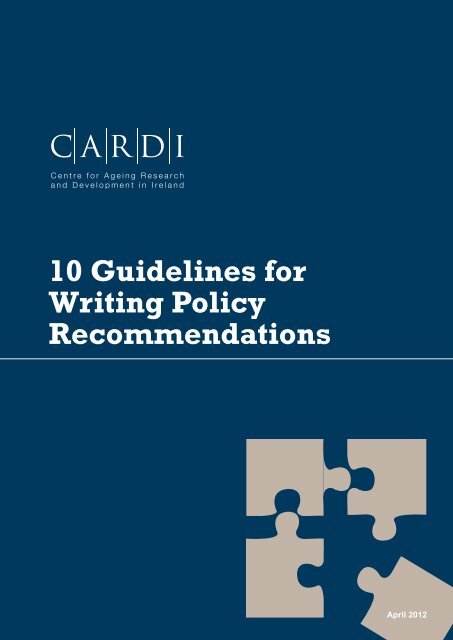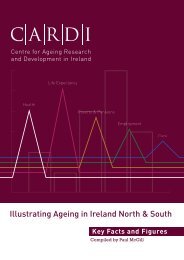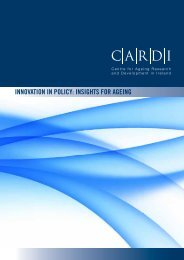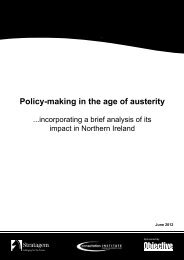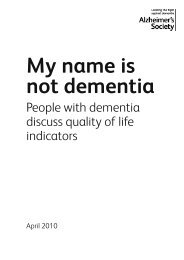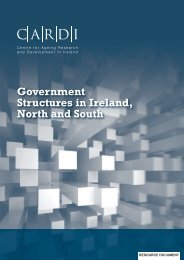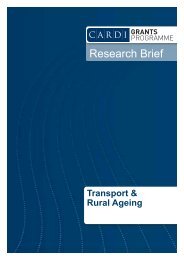10 Guidelines for Writing Policy Recommendations - CARDI
10 Guidelines for Writing Policy Recommendations - CARDI
10 Guidelines for Writing Policy Recommendations - CARDI
- No tags were found...
Create successful ePaper yourself
Turn your PDF publications into a flip-book with our unique Google optimized e-Paper software.
<strong>10</strong> <strong>Guidelines</strong> <strong>for</strong><br />
<strong>Writing</strong> <strong>Policy</strong><br />
<strong>Recommendations</strong><br />
April 2012
FACT SHEET<br />
A policy recommendation is written policy advice prepared <strong>for</strong> some group<br />
or person that has the authority to make or to influence policy decisions,<br />
whether that is a minister in the Republic of Ireland (ROI), or in Northern<br />
Ireland (NI), a member of parliament, a local authority, parliamentary<br />
committee or other public body such as a health or education agency. <strong>Policy</strong><br />
recommendations serve to in<strong>for</strong>m people who are faced with policy choices on<br />
particular issues about how research and evidence can help to make the best<br />
decisions. It is about using research to solve a public policy problem or to<br />
provide evidence about how a policy is working. Getting a recommendation<br />
accepted by policymakers depends on many factors but a recommendation<br />
which is based on strong evidence, is cost effective to implement and takes<br />
account of international best practice has a better chance of being accepted<br />
and influencing policy debates. With this in mind, Conor Breen, <strong>CARDI</strong> <strong>Policy</strong><br />
Officer, has prepared a set of guidelines <strong>for</strong> academics and other researchers<br />
<strong>for</strong> writing policy recommendations based on research.<br />
1. DEFINE THE OBJECTIVE<br />
The first step in crafting a policy recommendation is to decide what the objective of the<br />
recommendation is. Is it the introduction of new legislation, or changes to existing laws Is it a new<br />
strategy <strong>for</strong> government, or change in direction of an existing strategy or to improve an existing policy or<br />
service Or to draw attention to a local issue such as planning or transport services Setting out a clear<br />
objective <strong>for</strong> a policy recommendation based on research is essential in helping to influence decisions.<br />
2. DECIDE ON A TARGET AUDIENCE<br />
The next step in developing a policy recommendation is to determine the target audience. If it is a<br />
planning or local funding issue, the target may be a local authority, city or district council. If the<br />
recommendation is to change national legislation, the target audience may be ministers, TDs, MLAs or<br />
MPs. If the objective is to influence government strategy, a parliamentary committee or civil servants in<br />
government departments will likely be the best audience. It is important to also decide who the key<br />
stakeholders are and what influence they can have on the policy decisions, i.e. what NGOs,<br />
government departments, businesses, etc. will have an interest in the area and the research that you<br />
have produced.<br />
<strong>10</strong> <strong>Guidelines</strong><br />
<strong>for</strong> <strong>Writing</strong> <strong>Policy</strong><br />
<strong>Recommendations</strong>
FACT SHEET<br />
3. SET OUT THE ISSUE CLEARLY<br />
The matter on which a policy decision is required should be defined in as much detail as possible,<br />
directly linked to research. It is also important to have a clear outline of the existing situation. Presenting<br />
an analysis of the issue will also be invaluable to policymakers, including details of what strategy,<br />
legislation or government policy currently applies and why the research evidence indicates a need <strong>for</strong><br />
change. The recommendations should then be limited to the issue at hand and to the research<br />
evidence itself.<br />
4. GIVE OPTIONS WHERE POSSIBLE<br />
If there are several different approaches which policy makers could take to solve the issue, noting the<br />
advantages and disadvantages of each approach, based on research evidence, will make the decision<br />
easier. This will help in making research more influential and relevant to policymakers.<br />
5. RECOGNISE THE CURRENT ECONOMIC CLIMATE<br />
In the current economic environment in both ROI and NI, government and local authority budgets are<br />
highly constrained in the amounts that can be spent. Thus, while research may identify suitable policy<br />
directions which could solve issues, if these policy directions incur significant costs, they are unlikely to<br />
be taken on board. <strong>Recommendations</strong> should be cost-neutral where possible, or demonstrate that they<br />
are economically feasible, i.e. while money needs to be spent now, it will save large amounts of public<br />
expenditure in the future. A policy recommendation that would bring benefits while reducing costs is<br />
likely to be very welcome.<br />
6. FIT IN WITH EXISTING STRATEGIES OR LEGISLATION<br />
Overall policy direction in NI and ROI is clearly set out in the Programme <strong>for</strong> Government and Budget<br />
documents. Getting new legislation or a new government strategy adapted is a lengthy and timeconsuming<br />
process where evidence and political will need to be built up over long periods. Research<br />
can contribute to this process by steadily building up the body of knowledge on particular issues,<br />
helping to change opinions among the public and influential policy decision makers. However, a policy<br />
recommendation may have a bigger independent impact if it can fit in with an existing strategy,<br />
programme <strong>for</strong> government or legislation. Research is best at influencing policy that is currently in<br />
development, e.g. the new Positive Ageing strategy in ROI or Older People’s Strategy in NI. A<br />
recommendation can influence the development of new policy, in framing recommendations, it is<br />
important to be aware of current and future developments in policy in that area.<br />
<strong>10</strong> <strong>Guidelines</strong><br />
<strong>for</strong> <strong>Writing</strong> <strong>Policy</strong><br />
<strong>Recommendations</strong>
FACT SHEET<br />
7. USE INTERNATIONAL EXAMPLES<br />
When making a policy recommendation, it is a good idea to check if a similar approach has been taken<br />
in another country, and to outline any successes or drawbacks using real world examples. If another<br />
government, local authority, agency, etc. has been particularly successful in handling a policy issue, a<br />
recommendation will be made much stronger by reference to international best practice. This is<br />
particularly true if the example used is from a similar country in terms of size, demographics and<br />
political system and the example is innovative, cost-effective and is a demonstrated success.<br />
8. REMEMBER THE AUDIENCE<br />
Academic and technical language should never appear in policy recommendations. They should be<br />
presented in clear, readable and simple language; easily understandable to any passing reader with no<br />
prior knowledge of the subject area. In general, the audience <strong>for</strong> policy recommendations will not be<br />
interested in methodology other than knowing that the findings are robust. The important thing is to<br />
prioritise in<strong>for</strong>mation <strong>for</strong> policymakers and a link to the full report or research findings is sufficient.<br />
9. SHOW AN IMPACT IN THE REAL WORLD<br />
It is important to write recommendations that present clear arguments as to why the research shows<br />
that the recommendation will benefit society, at individual, community and national levels. Practical<br />
examples which demonstrate effectiveness in the real world can help to achieve this.<br />
<strong>10</strong>. EMPHASISE THE IMPORTANCE OF ACTION<br />
<strong>Policy</strong>makers are faced with a large number of issue which require attention and action. There<strong>for</strong>e<br />
policy recommendations need to convince them that the issue highlighted by research is important, and<br />
the recommended course of action will be beneficial to society in some respect if action is taken.<br />
<strong>10</strong> <strong>Guidelines</strong><br />
<strong>for</strong> <strong>Writing</strong> <strong>Policy</strong><br />
<strong>Recommendations</strong>
FACT SHEET<br />
Why should academic researchers consider writing policy recommendations<br />
The highest quality research can have a hugely beneficial impact on society, the economy and<br />
individual lives. It can improve economic per<strong>for</strong>mance, increase the effectiveness of public<br />
services and public policy, and enhance quality of life and outcomes in areas such as health,<br />
education, culture or recreation. Communicating research findings is a crucial part of maximising<br />
this impact. Academic researchers should write policy recommendations based on their research<br />
so that people in positions of influence can use the findings to enact real change to policy and<br />
society. In the UK (including NI), impact will be part of the next Research Assessment Exercise. 1<br />
As a result, influencing policy is a good and worthwhile thing to do, but also funding of research<br />
will increasingly depend on it.<br />
1 The Research Assessment Exercise (RAE) is undertaken every five years on behalf of the four UK higher education funding councils.<br />
The aim is to evaluate the quality of research undertaken by higher education institutions.<br />
SUGGESTED FURTHER READING<br />
<strong>CARDI</strong> (20<strong>10</strong>) Government Structures in Ireland, North and South<br />
<strong>CARDI</strong> (20<strong>10</strong>) Stocktake of Ageing Public <strong>Policy</strong> Initiatives in Ireland, North and South<br />
Harvey, B. (2008) Working <strong>for</strong> Change: A guide to Influencing policy in Ireland, Combat Poverty Agency<br />
Knox, C. (20<strong>10</strong>) <strong>Policy</strong> Advocacy in Northern Ireland, University of Ulster<br />
Nutley, S., Walter, I. & Davies, H. (2007) Using Evidence – how research can in<strong>for</strong>m public services,<br />
The <strong>Policy</strong> Press<br />
Quinn, O. (2008) Advisers or advocates: the impact of state agencies on social policy, Institute of<br />
Public Administration<br />
Forestview<br />
Purdy’s Lane<br />
Belfast BT8 7ZX<br />
t: + 44 (0) 28 9069 0066<br />
f: + 44 (0) 28 9064 6604<br />
Level 5<br />
Bishops Square<br />
Redmond’s Hill, Dublin 2<br />
t: + 353 (0) 1478 6300<br />
f: + 353 (0) 1478 6319<br />
www.cardi.ie<br />
info@cardi.ie


